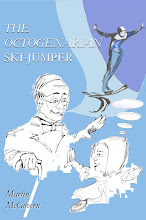I give below what I saw in a representative range of books, ordered by physical page number. Note that when I refer to page 1, I mean the first printed page, not the cover.
Page 1. Title page. This typically contains the title, and sometimes the author’s name. For example
The Octogenarian Ski-jumper
Page 2. Usually blank, but may contain a list of other books by the same author.
Page 3. Title page again. This typically contains the title, the author’s name, and in contrast to page 1, the name of the publisher. It may also include the sub-title if your book has one. For example
The Octogenarian Ski-jumper:
a compilation of achievements
a compilation of achievements
and recognitions at all ages
Martin McGovern
Martin McGovern
Page 4. The copyright page. At a minimum, this will contain the author’s name, the copyright symbol ‘©’ and the year of publication. It will typically also contain the ISBN number of the book, the name and sometimes the address of the publisher, website information associated with the book and/or the author, and legal information. the font used for the copyright page is usually slightly smaller than for the rest of the text. For example:
Copyright © by Martin McGovern 2009
Martin McGovern has asserted his right under the Copyright, Designs and Patents Act 1988 to be identified as the author of this work.
This book is sold subject to the condition that it shall not, by way of trade or otherwise, be lent, resold, hired out, or otherwise circulated without the author’s prior consent in any form of binding or cover other than that in which it is published and without a similar condition, including this condition, being imposed on the subsequent purchaser.
http://octogenarianski-jumper.blogspot.com
Page 5. From this point onward, there is more variation in the order of the items in the frontmatter. But in general, Page 5 contains either a quotation of some kind, or a dedication. In Stephen Potter’s hilarious Lifemanship (itself dedicated ‘To Anon’), he advises a dedication ‘to Phyllis, in the hope that God’s glorious gift of sight may be restored to her’. The thinking is that no reviewer will say anything bad about the book.
Page 5 can sometimes contain either Acknowledgements - information of the form ‘I would like to thank the following people who helped me research and write this book’ – or the Contents – typically a list of chapters and the page numbers they start on. There is a theory that each person you include in the Acknowledgements will buy a copy of the book, and may even buy several copies to give to their friends. But don't include too many - most readers won't care if your best friend once made you a cup of tea when you had writer's block.
Page 6. Usually blank, unless the Contents or Acknowledgements run to more than one page.
Page 7. Usually the Contents if you’re including them and haven’t yet.
Page 8. Usually blank unless the Contents on page 7 run to more than one page.
Page 9. The most likely page for the text itself to start on. But other frontmatter items may be required – for example, a preface/introduction, or a list of illustrations. The rule in general is that a new frontmatter item will start on an odd-numbered page, and so will the text. One other item you might want to consider is a repeat of the title page: if you’ve included bulky text such as acknowledgements or an introduction, it’s a good way of indicating to the reader that the book itself is about to start.
One other thing you'll notice about the frontmatter is that some of the pages don't have page numbers. If there are page numbers, they are much more likely to be in roman numbers (i, ii, iii, iv and so on) than traditional 'arabic' numbers. I'll be addressing the fiddly matter of formatting and getting the page numbering you want in a later posting.



